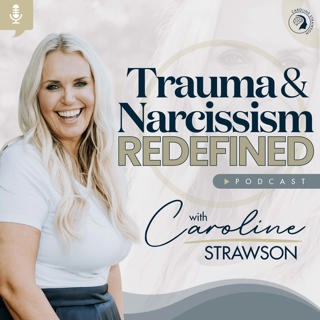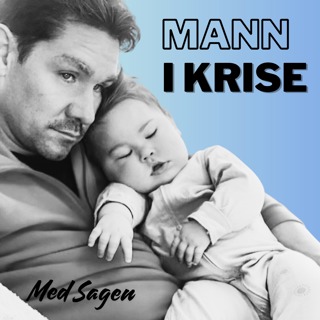
Anxiety, Depression and Narcissistic Abuse
Today we’re talking about anxiety and depression, not as mere symptoms that need to be treated, but as parts of us showing up for a certain reason. Let’s ask ourselves - why are we anxious, why are we depressed, why are those parts showing up? What You Will Learn In This Episode: Looking at anxiety and depression as trauma responses within our body Deb Dana's ladder analogy in the context of narcissistic relationships The role of anxiety as the sympathetic trauma response The role of depression in our system state How to look at anxiety and depression as parts of ourselves and not identify with them The reason why people stay in abusive relationships How to understand the intentions of all our parts and welcome them to our system Once we see anxiety and depression as parts of us reacting to trauma, we will realise that we are not a depressed or anxious individual, but we have parts that are showing up in order to distract us and soothe us from feeling the pain of our younger, wounded part. Resources: Join my Facebook group at https://www.facebook.com/groups/thriveafternarcissisticabuse Connect with me on Instagram: https://www.instagram.com/carolinestrawson/
8 Des 202019min

The Difference Between Narcissism and Confidence
Today I want to talk about two words that may conjure up very different concepts to you, and they are narcissism and confidence. We go over what narcissism is, what true confidence is, and how to tell a difference. What You Will Learn In This Episode: The difference between narcissistic traits and narcissistic personality disorder The difficulties with diagnosing someone as a narcissist Why we need to be careful when we use the word narcissist Why we perceive narcissists as being confident and what lies beneath that confidence Internal Family Systems and using Parts theory to understand narcissism How to recognise truly confident persons Because we can’t change narcissists, let’s get back to trying to live as much as possible as your true authentic self, as someone who is curious, calm, connected, courageous, creative, confident, compassionate, and lives with clarity. How much of your life are you living like that? Resources: Join my Facebook group at https://www.facebook.com/groups/thriveafternarcissisticabuse Connect with me on Instagram: https://www.instagram.com/carolinestrawson/
1 Des 202020min

Signs of Dating a Narcissist
Today we talk about the little signs and the red flags that we must be aware of when we start dating someone new. Even after a traumatic separation, at some point we need to start meeting new people, but we must have ears and eyes open to the signs of narcissistic behavior, so we know what to do if they keep happening. What You Will Learn In This Episode: How we can step out into the dating world after a traumatic experience What is "love bombing" and how to detect it A key red flag - the narcissist’s lack of empathy Gaslighting as the real hallmark of narcissism The "I'm not apologizing" story and why narcissists believe they’re never wrong The importance of having a positive relationship with yourself The dating world after a divorce or a breakup can be terrifying. But it's important to remember that being with someone is not always better than being single. So if we decide to take a new chance, we must have our narcissistic radar on point to avoid falling into that trap. Resources: Join my Facebook group at https://www.facebook.com/groups/thriveafternarcissisticabuse Connect with me on Instagram: https://www.instagram.com/carolinestrawson/
24 Nov 202016min

Help!!! I'm Addicted to a Narcissist!
In this episode I’m talking about the addiction to the narcissist in your life, how to deal with it, and the first steps to overcome it. Remember that every addiction serves to stop us from feeling the pain of our wounded younger part, and today we are going to unpack that mechanism. What You Will Learn In This Episode: Recognizing the difference between knowing you are good enough and feeling like you are not How our body gets addicted to not feeling good enough How our brain reacts to our biggest perceived pain The importance of no contact or extremely modified contact with the narcissist in your life Why our brain always reverts to what is familiar even when it’s painful In a relationship with a narcissistic person, we are continually trying to prove that we are good enough, and our body gets used to that sensation. Not feeling good enough then becomes familiar, and our brain perceives what's familiar as what's safe, thus ignores the pain we are feeling and perpetuates that cycle. Resources: Join my Facebook group at https://www.facebook.com/groups/thriveafternarcissisticabuse Connect with me on Instagram: https://www.instagram.com/carolinestrawson/
17 Nov 202024min

The Narcissist's True Intention
Do narcissists deliberately try to hurt you? What is their driving force? Even when they say or do horrible things to us, the narcissist’s intention is purely about themselves. What they pursue is the narcissistic drug of choice, what we call the narcissistic supply. That is the only thing they are after. What You Will Learn In This Episode: - Narcissistic abuse happens TO you. It doesn’t happen BECAUSE of you. - Why your pain is just the byproduct of the narcissist’s behavior - Where the narcissist’s need for mistreating you really comes from - Narcissistic aggression and manipulation as the expression of their younger, wounded part - How to recognise when the narcissist is pretending to behave in a certain way to achieve what they want When narcissists hurt us, they want to heal their wounds at our expense. It has nothing to do with our integrity or our values. So remember that it is YOU who is holding the power to heal, and change the perception of your own childhood experiences. Resources: - Join my Facebook group https://www.facebook.com/groups/thriveafternarcissisticabuse - Connect with me on Instagram https://www.instagram.com/carolinestrawson/
10 Nov 202019min

What Is Narcissistic Personality Disorder
In this week’s episode, I want to talk about what exactly a narcissist is, and what tool is used to identify narcissistic personality disorder. We tend to wrongly label narcissists as those who take lots of selfies or those who are rude to us, and by doing that, we are not helping the real victims of narcissistic abuse. What You Will Learn In This Episode: •The difference between being a narcissist and being obnoxious •How being a victim of Narcissistic Personality Disorder affected me •Are narcissistic personalities born or created? •The Diagnostic and Statistical Manual (DSM) nine traits to detect Narcissistic Personality Disorder •The importance of educating the society regarding NPD and helping its victims If someone you know ticks the boxes of at least five of the nine traits described by the DSM, the person has NPD. This method might help you get some reassurance of what you are dealing with and that it is not your fault. Resources: Join my Facebook group at https://www.facebook.com/groups/thriveafternarcissisticabuse Connect with me on Instagram: https://www.instagram.com/carolinestrawson/
3 Nov 202017min

Five Key Phrases to Disarm the Narcissist
Today I want to share with you the five key phrases that are great to disarm the narcissist. These phrases really helped me and my clients to understand that the power is within us to heal from narcissistic abuse. Five Key Phrases to Disarm the Narcissist: I'm so sorry you feel like that. I can accept your faulty perception of me. I have no right to control how you see me. I accept that this is how you feel. Your anger is not my responsibility. Keep me posted if you're using any of these five phrases to disarm the narcissist. I would love to hear what their expressions were like, what they said back to you. Even if you don't feel these right now, remember that it's all about dis-confirming those experiences, but we have to start somewhere. So give these phrases a try. Resources: Join my Facebook group: https://www.facebook.com/groups/thriveafternarcissisticabuse
27 Okt 202015min

Narcissistic Abuse and Internal Family Systems
In this episode, I want to talk about the different parts of you, that may be stopping you from healing from narcissistic abuse. In working with my clients, I use an evidence based parts therapy called Internal Family Systems, and I’m going to explain what it is and how it can help you heal. What You Will Learn In This Episode: Internal Family Systems and the concept of True Self Two main types of Protector parts - Manager and Firefighter How physical conditions can play their parts How we can change the roles of the parts to start healing from narcissistic abuse How you can create a map of your parts to become aware of them What is reconsolidation of memory Working with parts as I explained them here can help you update that younger part of you, so the roles of the Protector parts won't need to be so reactive, proactive or destructive, and you can start healing from narcissistic abuse. Resources: Join my Facebook group at https://www.facebook.com/groups/thriveafternarcissisticabuse Connect with me on Instagram: https://www.instagram.com/carolinestrawson/
20 Okt 202018min





















